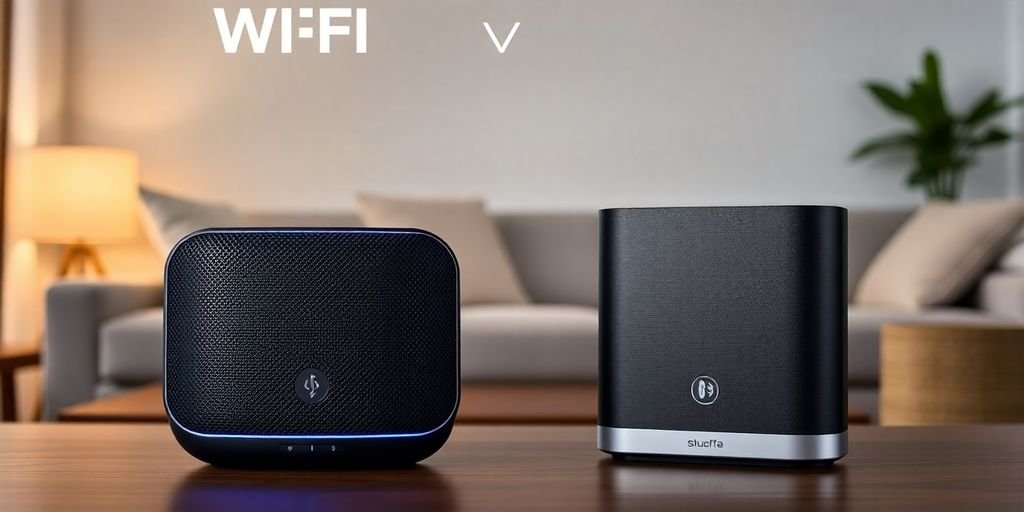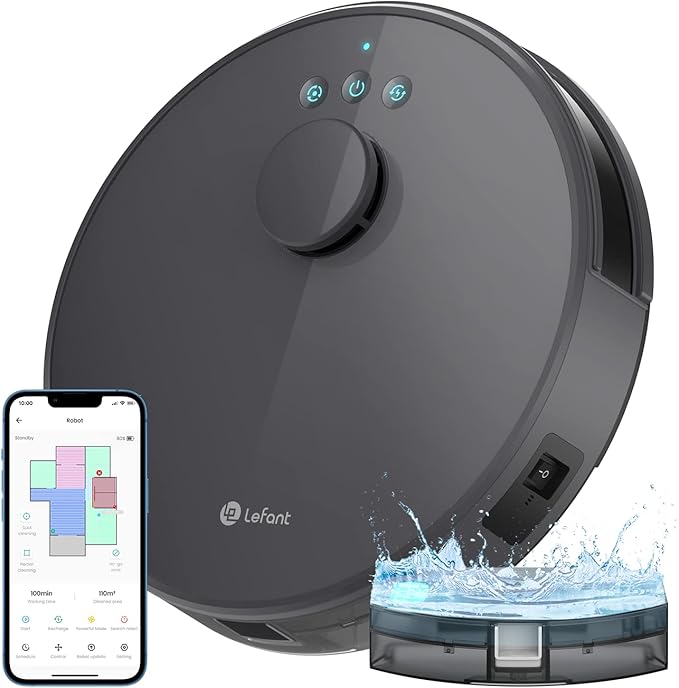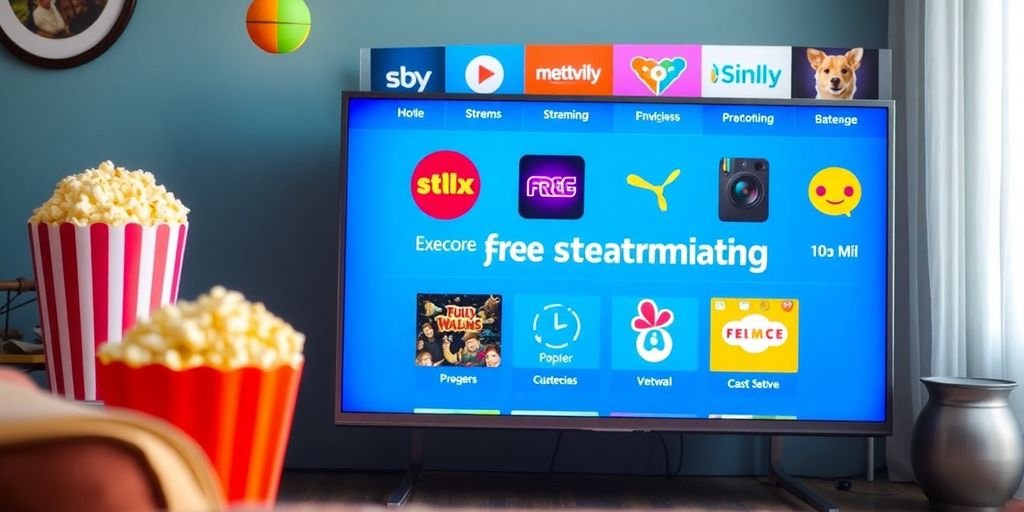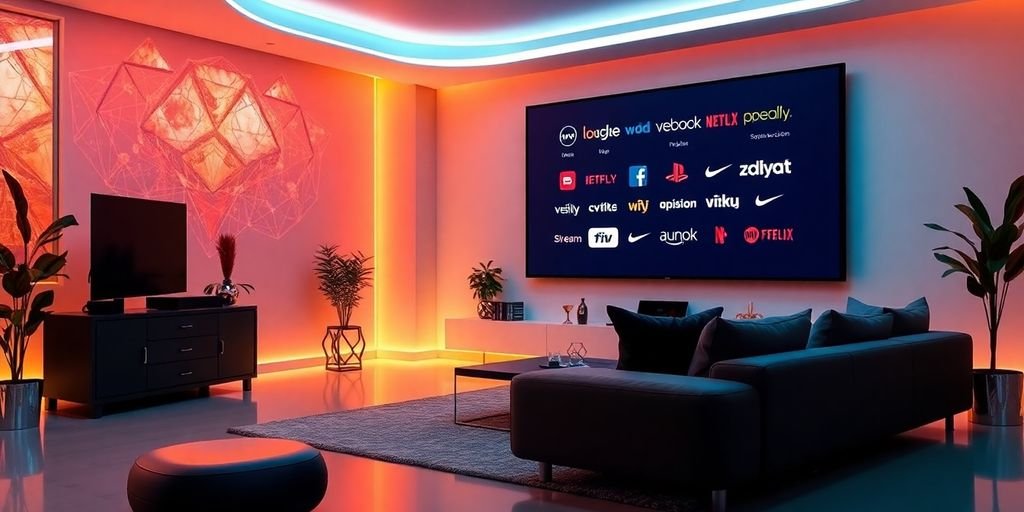In the world of audio, the choice between Wi-Fi speakers and Bluetooth speakers can be a tough one. Each technology has its own strengths and weaknesses, and as we step into 2025, it’s essential to understand what each brings to the table. Whether you’re looking for superior sound quality, portability, or smart home integration, this article will help you decide which option might be the best fit for your needs.
Key Takeaways
- Wi-Fi speakers generally provide better audio quality and range compared to Bluetooth speakers.
- Bluetooth speakers are more portable and easier to use, making them perfect for casual listening.
- Wi-Fi speakers can support multiple rooms and connect with various apps for enhanced control.
- Bluetooth speakers tend to have longer battery life, ideal for on-the-go use.
- Understanding your specific audio needs will help you choose the right speaker technology.
Understanding The Core Differences Between Technologies
It’s easy to think that all wireless speakers are created equal, but Wi-Fi and Bluetooth speakers use very different tech. Understanding these differences is key to picking the right one for your needs. Let’s break down the core aspects.
Audio Quality Comparison
Wi-Fi generally wins in audio quality. Wi-Fi speakers can handle higher bandwidth, which means they can stream lossless audio files without compression. Bluetooth, on the other hand, often compresses audio, which can result in a noticeable loss of detail. Think of it like this: Wi-Fi is like a wide pipe that can carry a lot of water (data) at once, while Bluetooth is a narrower pipe. If you’re an audiophile, this difference is a big deal.
Range and Connectivity
Wi-Fi has a significant advantage in range. Bluetooth’s range is limited to around 30-40 feet, and walls can shorten that even more. Wi-Fi, using your home network, can cover a much larger area. Plus, Wi-Fi allows for multiple devices to connect to the same network without significant degradation in performance. Bluetooth is more of a one-to-one connection. If you want whole-house audio, Wi-Fi is the way to go. You can achieve convenient audio streaming throughout your home.
Latency Issues
Latency, or the delay between sending and receiving audio, can be a problem with both technologies, but it’s often more noticeable with Bluetooth. This is because Bluetooth connections can be less stable and more prone to interference. Wi-Fi, especially on a well-configured network, usually has lower latency. This is important if you’re using the speakers for things like watching videos or playing games, where even a small delay can be distracting.
The choice between Wi-Fi and Bluetooth really boils down to what you value most. If sound quality and range are your top priorities, Wi-Fi is the clear winner. But if you need something portable and easy to use, Bluetooth might be a better fit.
The Advantages of Wi-Fi Speakers
Wi-Fi speakers have really stepped up their game in the last few years. They’re not just about playing music anymore; they’re about creating a whole-home audio experience. Let’s look at some of the reasons why people are choosing Wi-Fi over Bluetooth.
Multi-Room Support
One of the biggest advantages of Wi-Fi speakers is their ability to sync across multiple rooms. Forget about having to carry a Bluetooth speaker from the living room to the kitchen. With Wi-Fi, you can have music playing seamlessly throughout your entire house. Systems like Sonos make this super easy, but even standard Wi-Fi setups are getting better at multi-room audio. Imagine hosting a party where the music follows your guests as they move around – that’s the power of multi-room Wi-Fi.
App Integration
Wi-Fi speakers often come with dedicated apps that give you a ton of control. We’re talking about more than just volume control. Think EQ settings, playlist management, and even integration with streaming services. The best audio streamer apps let you fine-tune the sound to your liking and create custom listening experiences. Plus, many of these apps support voice control, so you can adjust the music without even lifting a finger.
Future-Proofing Features
Wi-Fi speakers are generally more future-proof than Bluetooth speakers. They can receive over-the-air updates that add new features and improve performance. This means your speaker will keep getting better over time.
Wi-Fi speakers are also more likely to support emerging audio formats and technologies. As new standards come out, your Wi-Fi speaker can adapt, ensuring that you’re always getting the best possible audio quality. This is a big deal for audiophiles who want to stay ahead of the curve.
Here are some examples of future-proofing features:
- Support for high-resolution audio formats
- Compatibility with new streaming services
- Integration with smart home platforms
The Benefits of Bluetooth Speakers

Bluetooth speakers have carved out a significant space in the audio world, and for good reason. They bring a set of advantages that appeal to a wide range of users, especially those who value simplicity and on-the-go convenience. Let’s explore what makes them so popular.
Portability and Convenience
The biggest draw of Bluetooth speakers is their portability. They’re designed to be taken anywhere. I remember lugging around a huge boombox as a kid, and it’s amazing how far we’ve come. Most Bluetooth speakers are compact and lightweight, making them easy to toss in a bag or carry around. This makes them perfect for picnics, beach trips, or just moving from room to room in your house. Plus, the wireless nature means no tangled cords to worry about. You can easily connect your phone or other device and start playing music in seconds. It’s just so simple.
Ease of Use
Bluetooth speakers are incredibly easy to use. Pairing is usually a breeze – just turn on the speaker, find it in your device’s Bluetooth settings, and connect. Once paired, your device will usually remember the speaker, so you don’t have to repeat the process every time. There aren’t any complicated setups or software installations required. Even my grandma can use one! This simplicity makes them a great option for people who aren’t tech-savvy or who just want a hassle-free listening experience. For everyday use, Bluetooth is the go-to option.
Battery Life Considerations
Battery life is a key factor for any portable device, and Bluetooth speakers are no exception. The battery life of Bluetooth speakers can vary widely depending on the size, features, and volume level. Smaller speakers might only last for a few hours, while larger ones can play for ten hours or more. It’s important to consider how you plan to use the speaker when choosing one. If you need it for all-day use, look for models with longer battery life. Also, keep in mind that playing music at higher volumes will drain the battery faster. Many speakers now come with power-saving features that can help extend battery life, such as automatic shut-off when not in use.
I’ve found that investing in a speaker with a decent battery life is worth it. There’s nothing worse than having your music cut out in the middle of a party or hike. It’s always a good idea to check reviews and see what other users are saying about the battery performance of a particular model. That way, you can make sure you’re getting a speaker that will last as long as you need it to.
Use Cases: When To Choose Each Option
Home Audio Systems
For a home audio setup, Wi-Fi speakers often shine. Think about it: you want whole-house audio, controlled from your phone. Wi-Fi’s multi-room capabilities make this a breeze. Bluetooth? Not so much. You’d be stuck with one speaker at a time, or dealing with finicky pairing issues. Plus, Wi-Fi speakers can tap into your home network for streaming services directly, without needing your phone as an intermediary.
Outdoor Activities
Bluetooth speakers are the clear winner here. You’re at the beach, a picnic, or just chilling in the backyard. Portability is key. Lugging around a Wi-Fi speaker that needs a power outlet and network connection? Forget about it. A rugged, battery-powered Bluetooth speaker is much more practical. Plus, pairing your phone is quick and easy. For example, the best home Bluetooth speakers are easy to pair with mobile devices.
Casual Listening Scenarios
This is where it gets interesting. For just kicking back at home, maybe doing chores or reading, either option works. It really comes down to personal preference. Do you want the simplicity of Bluetooth, or the higher audio quality potential of Wi-Fi? If you’re just throwing on some background music, Bluetooth is probably fine. But if you’re an audiophile who wants the best possible sound, Wi-Fi might be the way to go.
Ultimately, the choice depends on your priorities. Are you looking for convenience and portability, or are you focused on sound quality and multi-room capabilities? Consider how you’ll primarily use the speaker, and that should guide your decision.
The Future of Wireless Audio Technology

Wireless audio is changing fast, and it’s exciting to see where things are headed. Both Wi-Fi and Bluetooth are constantly getting better, and they’re starting to work together in cool ways. It’s not just about speakers anymore; it’s about how audio fits into our whole connected world.
Emerging Trends in Wi-Fi Speakers
Wi-Fi speakers are becoming more than just music players. They’re evolving into central hubs for smart homes. Here’s what I’m seeing:
- Better integration with smart home platforms: Expect Wi-Fi speakers to work even more smoothly with systems like Google Home, Amazon Alexa, and Apple HomeKit. This means voice control will get smarter, and you’ll be able to control more devices with your voice.
- Improved audio quality: Wi-Fi allows for higher bandwidth, which means better sound. We’ll likely see more speakers supporting lossless audio formats and higher sampling rates. Wireless streamers are already enhancing the music experience.
- More sophisticated multi-room capabilities: Setting up and managing multi-room audio systems will become easier, with more intuitive apps and smarter speaker grouping.
I think we’ll see Wi-Fi speakers that can automatically adjust their sound based on the room they’re in. Imagine a speaker that knows it’s in a small bedroom versus a large living room and adjusts the EQ accordingly. That would be awesome.
Advancements in Bluetooth Technology
Bluetooth is also stepping up its game. While it’s always been known for portability, it’s now focusing on improving audio quality and connectivity. Check out these advancements:
- Bluetooth 5.2 and beyond: Newer versions of Bluetooth offer better range, faster speeds, and lower power consumption. This is great for battery life and for connecting to devices that are further away.
- Improved codecs: Codecs like aptX Adaptive are making Bluetooth audio sound much better. They can dynamically adjust the bitrate based on the connection quality, so you get the best possible sound without dropouts. There are even aptX HD receivers available now.
- Directional Audio: Imagine headphones that can simulate surround sound by subtly shifting the audio to different parts of the ear. This could make listening to music and watching movies much more immersive.
Integration with Smart Home Devices
This is where things get really interesting. Wi-Fi and Bluetooth are starting to work together to create seamless audio experiences throughout the home. Here’s how:
- Hybrid systems: Some speakers now use both Wi-Fi and Bluetooth. You can use Wi-Fi for high-quality streaming at home and switch to Bluetooth when you’re on the go.
- Smart home hubs with audio capabilities: Devices like smart displays and smart speakers are becoming central hubs for controlling all your smart home devices, including your audio system.
- Context-aware audio: Imagine your smart home knowing when you walk into a room and automatically playing your favorite music. Or, if you’re watching a movie, the system could adjust the lighting and sound to create the perfect viewing experience.
It’s all about making audio more convenient, more immersive, and more integrated into our lives. The future of wireless audio is looking pretty bright!
Price Points and Value for Money
Let’s be real, nobody wants to overspend on tech. When it comes to Wi-Fi and Bluetooth speakers, the price range can be pretty wild. You can find something that fits almost any budget, but it’s important to know what you’re getting for your money. Are you paying for features you’ll actually use, or just a brand name? That’s the question we’ll try to answer.
Budget Options
On the lower end, you’re mostly looking at Bluetooth speakers. These are great for casual listening and portability. You can snag a decent one for under $50, sometimes even less if you catch a sale. Don’t expect audiophile-grade sound, but they’re perfect for throwing in a bag or taking to the park. Wi-Fi speakers at this price point are rare, and if you find one, be wary of the sound quality and features. You might find a Beats Pill Wireless Portable Bluetooth Speaker on sale.
Mid-Range Choices
This is where things get interesting. In the $100-$300 range, you’ll find both Wi-Fi and Bluetooth speakers that offer a good balance of sound quality, features, and build quality.
- Wi-Fi speakers in this range often include multi-room support and better app integration.
- Bluetooth speakers will boast improved battery life, rugged designs, and maybe even some waterproofing.
- You’ll start seeing features like voice assistant compatibility and customizable EQ settings.
It really comes down to what you value most. Do you want the convenience of Bluetooth or the expanded features of Wi-Fi?
High-End Investments
If you’re willing to drop some serious cash (think $300+), you’re entering audiophile territory. High-end Wi-Fi speakers offer exceptional sound quality, premium materials, and advanced features like lossless audio streaming. Bluetooth speakers at this price point often focus on portability, durability, and powerful sound, like the Sony XG500 MEGA BASS.
It’s important to consider the longevity of your investment. While Bluetooth technology is constantly improving, Wi-Fi speakers often receive software updates that add new features and improve performance over time. This can make them a better long-term value, especially if you plan on integrating them into a smart home ecosystem.
Ultimately, the best speaker for you depends on your individual needs and budget. Consider how you’ll be using the speaker, what features are most important to you, and how much you’re willing to spend. Don’t be afraid to read reviews and compare different models before making a decision.
User Experience and Setup
Installation Process
Okay, let’s be real – nobody wants to spend hours wrestling with cables and confusing instructions. When it comes to setup, both Wi-Fi and Bluetooth speakers have their quirks. Wi-Fi speakers often require connecting to your home network, which can sometimes involve downloading an app and entering your Wi-Fi password. It’s usually pretty straightforward, but occasionally you might run into issues with network compatibility or signal strength. Bluetooth speakers, on the other hand, are generally easier to pair initially. You just put them in pairing mode and connect from your phone or device. However, Bluetooth can sometimes be finicky, especially when trying to connect to multiple devices or if there’s interference.
Control and Customization
How you actually use the speaker day-to-day is a big deal. Wi-Fi speakers often come with dedicated apps that let you control volume, create playlists, and manage multi-room setups. Some even integrate with voice assistants like Alexa or Google Assistant, so you can control them with your voice. Bluetooth speakers are usually controlled directly from your phone or device, which is simple but might not offer as many advanced features. The level of customization really depends on the specific speaker and app, but Wi-Fi generally offers more options for tweaking the sound and experience.
User Feedback and Reviews
What are people actually saying about these speakers? User reviews can be a goldmine of information about real-world performance and potential problems. Look for common complaints or praises regarding setup, connectivity, sound quality, and app usability. For example, some users might praise the ease of setting up a multiroom wireless speaker system, while others might complain about spotty Bluetooth connections. Pay attention to reviews that mention specific use cases similar to your own, such as using the speaker outdoors or in a large room. Also, keep an eye out for reviews that mention customer support experiences, as that can be a good indicator of how responsive the company is to resolving issues.
It’s worth noting that user experience is subjective. What one person finds easy, another might find frustrating. Read a variety of reviews and consider your own technical skills and preferences when making a decision.
Final Thoughts: Choosing Your Ideal Speaker
In the end, picking between a WiFi speaker and a Bluetooth speaker really comes down to what you need. If you want top-notch sound quality and the ability to fill your whole house with music, WiFi speakers are the way to go. They’re perfect for serious listeners who want that clear, rich sound. On the flip side, if you’re looking for something portable and easy to use, Bluetooth speakers are great for on-the-go listening. They’re simple to connect and perfect for casual use. So, think about where and how you’ll use your speaker most. That’ll help you decide which one fits your lifestyle better.
Frequently Asked Questions
What is the main difference between Wi-Fi and Bluetooth speakers?
Wi-Fi speakers connect to your home network and can stream music from the internet, while Bluetooth speakers connect directly to your phone or tablet for music playback.
Which type of speaker offers better sound quality?
Generally, Wi-Fi speakers provide better sound quality because they can handle higher quality audio streams without losing detail.
Are Wi-Fi speakers more difficult to set up than Bluetooth speakers?
Wi-Fi speakers can be a bit more complicated to set up since they need to connect to your home network, while Bluetooth speakers are usually easier and quicker to connect.
Can I use Wi-Fi speakers outdoors?
Wi-Fi speakers usually need a stable internet connection, so they are better for indoor use. Bluetooth speakers are more portable and can be used outdoors without needing Wi-Fi.
Do Bluetooth speakers have a longer battery life than Wi-Fi speakers?
Yes, Bluetooth speakers typically have longer battery life since they are designed for portability and don’t need to stay connected to a Wi-Fi network.
Which speakers are better for listening to music in multiple rooms?
Wi-Fi speakers are better for multi-room listening because they can sync with each other over the network, allowing you to play the same music in different rooms.






